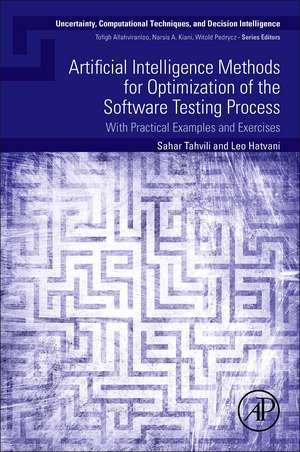Artificial Intelligence Methods for Optimization of the Software Testing Process: With Practical Examples and Exercises: Uncertainty, Computational Techniques, and Decision Intelligence
Autor Sahar Tahvili, Leo Hatvanien Limba Engleză Paperback – 26 iul 2022
As the number of required test cases for testing a product can be large (in industry more than 10,000 test cases are usually created). Executing all these test cases without any particular order can impact the results of the test execution, hence this book fills the need for a comprehensive resource on the topics on the how's, what's and whys.
To learn more about Elsevier’s Series, Uncertainty, Computational Techniques and Decision Intelligence, please visit this link: https://www.elsevier.com/books-and-journals/book-series/uncertainty-computational-techniques-and-decision-intelligence
- Presents one of the first empirical studies in the field, contrasting theoretical assumptions on innovations in a real industrial environment with a large set of use cases from developed and developing testing processes at various large industries
- Explores specific comparative methodologies, focusing on developed and developing AI-based solutions
- Serves as a guideline for conducting industrial research in the artificial intelligence and software testing domain
- Explains all proposed solutions through real industrial case studies
Preț: 623.14 lei
Preț vechi: 930.14 lei
-33% Nou
Puncte Express: 935
Preț estimativ în valută:
119.24€ • 124.25$ • 98.73£
119.24€ • 124.25$ • 98.73£
Carte tipărită la comandă
Livrare economică 27 martie-10 aprilie
Preluare comenzi: 021 569.72.76
Specificații
ISBN-13: 9780323919135
ISBN-10: 0323919138
Pagini: 230
Dimensiuni: 152 x 229 x 19 mm
Greutate: 0.32 kg
Editura: ELSEVIER SCIENCE
Seria Uncertainty, Computational Techniques, and Decision Intelligence
ISBN-10: 0323919138
Pagini: 230
Dimensiuni: 152 x 229 x 19 mm
Greutate: 0.32 kg
Editura: ELSEVIER SCIENCE
Seria Uncertainty, Computational Techniques, and Decision Intelligence
Cuprins
PART 1 Software testing, artificial intelligence, decision intelligence, and test optimization
1. Introduction
2. Basic software testing concepts
3. Transformation, vectorization, and optimization
4. Decision intelligence and test optimization
5. Application of vectorized test artifacts
6. Benefits, results, and challenges of artificial intelligence
7. Discussion and concluding remarks
PART 2 Practical examples and exercises
8. Environment installation
9. Exercises
Appendix A. Ground truth, data collection, and annotation
1. Introduction
2. Basic software testing concepts
3. Transformation, vectorization, and optimization
4. Decision intelligence and test optimization
5. Application of vectorized test artifacts
6. Benefits, results, and challenges of artificial intelligence
7. Discussion and concluding remarks
PART 2 Practical examples and exercises
8. Environment installation
9. Exercises
Appendix A. Ground truth, data collection, and annotation





